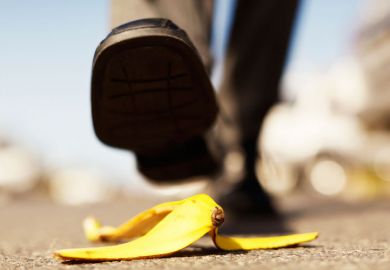Often we think that we learned to read by the time we were about 8. We know that we have to continue to learn to write and that the thesis is a major writing task that we have to learn how to succeed in – and there’s a lot of books, advice and workshops out there on improving doctoral writing.
But a lot of the difficulties that doctoral students have in getting started, in powering through the shitty middle, and in getting to completion, are actually caused by reading. And why? Because, and I hate to tell you this, you’re probably reading wrong.
Here are the five biggest reading mistakes that I see – and how to avoid them.
You read every text in the same way: journal article, seminal book, original source, further reading and tables of data
This is such a bad idea. And yet this is how we are taught to read texts at school and even at university. Even in arts subjects, known for their high volume of reading, undergraduates are given the two most useful journal articles (already photocopied) and a set text that they can buy from the university bookshop. You already know that the text is important – that’s why you were given it. You also know that the texts are limited – there are never more than three or four things to read in a week – so you read them carefully.
If it’s the poem that forms the centrepiece of your argument (as it is for my research), then of course you’re going to read every word. If you are in a field such as maths or science and you miss a single ∑ or 2 in your equation, the whole thing fails to work – or worse, explodes with noxious gases.
That’s not how you need to be reading the majority of your research. Most articles and books need to be viewed, but not closely analysed. So don’t read like an undergraduate, because you can’t. When your supervisor says “it may be worth your while quickly flicking through this article”, that is not code for “read this as if your PhD depends on it”. It honestly means quickly flick through that article.
You don’t want to miss anything out
You will. It doesn’t matter. Or rather, it’s not a disaster if you do. There will be a tiny number of texts that you need to go back to later that you didn’t think were important at the time. But even if you have to travel four hours by train and stay overnight (and for one archive I worked in, that was the case), you will waste less time returning to that archive than you will if you read every article as if it were your only chance.
Also, you will leave things out. You will miss stuff. It’s a PhD, not a Nobel prize. The examiners are expecting that. You only have 100,000 words max. That’s nothing compared with all knowledge, even to all vaguely relevant knowledge. If you still believe that your thesis is supposed to do more than make a limited and incremental contribution to your field, then read this first.
And if it really, really did matter, your supervisor or examiner will point it out – that’s what edits and revisions are for. But there will usually only be a small number of these.
You want to remember it all
Bwhahahahahahah. You won’t. And you don’t want to.
Trying to store all that stuff in your head crowds out room for the important cognitive stuff you need to be doing: making connections, interpretation, problem-solving. No one is storing this stuff in their heads (not even me, and I have a photographic memory).
You’ll want some stuff committed to memory – things you use every day – but for the rest…that’s what notes are for. Use index cards, ring binders, cloud storage, USB sticks, Evernote, Notability and plain old paper notebooks.
Need a better note-taking system? My paean to the Cornell method is here (and here is a link to a better template).
You think skim-reading is cheating
Anything that gets you closer to finishing is a good thing. Not stuff that’s unethical, of course: no mistreatment of animals, exploitation of human subjects or plagiarism. But a bit of skim-reading? Go for it! There is no moral or intellectual value in punishing yourself and a PhD is challenging enough without adding extra and unnecessary work.
You should be using the index at the back of books and contents pages. This also goes for digital reading – get your computer to skim for you by using Google Scholar, Google Books, and my favourite, Ctrl+F (search PDFs and documents for key terms).
Still feel uncomfortable? Rephrase “skim-reading”, “glancing over” or “index-dipping” as three stages of speed-reading: “previewing”, “spotting” and “using signposts”.
You believe speed-reading is the same as close reading, just faster
Everyone I know wants to speed-read. But they’re always disappointed when I tell them how to do it.
When I was writing my dissertation at the University of Cambridge, this was the best piece of advice that my supervisor gave me. I pass this on to you as a golden nugget of usefulness:
Speed-reading doesn’t all happen at one speed or one depth. You have an idea of what the text will give you because you read the abstract, the subheadings and picked the contention out of the introduction. (A tip: in literary journals, the contention is almost always about halfway down the second page). You whizz along, keeping an eye out for signposts such as chapter headings and topic sentences. When you spot something that seems useful, you slow down, you collect what you need and then move on. You know chapter 2 isn’t relevant, so you skip it entirely.
The thing that is different is that you, not the author, are in control of the speed and length of reading. Sometimes I spend two minutes on “reading” a massive 600-page biography and two hours reading a tiny 60-word poem. That’s what’s valuable for my research.
Perhaps you have noticed that my fifth point is extraordinarily like my first point…That is, you are reading wrong because you are trying to read as the perfect, well-behaved, passive recipient of great knowledge.
You are trying to read like a Victorian maiden in a novel so that you will be judged worthy of marrying the hero. Instead, act like the hero. Travel to the West Indies, make a fortune, have a disastrous love affair, captain a pirate ship, fight a duel, be in charge of your own adventure, make some mistakes, tell the texts what to do, plunder them for their gold and sail off into the sunset.
Reading is as nuanced and flexible a skill as writing or teaching – but unlike teaching or writing 80,000-word theses, you’ve been doing it for a long time. Just give yourself the permission to do it imperfectly and you will do it better.
Katherine Firth is head of academic programs at Trinity College, University of Melbourne. This post originally appeared on her blog.
Register to continue
Why register?
- Registration is free and only takes a moment
- Once registered, you can read 3 articles a month
- Sign up for our newsletter
Subscribe
Or subscribe for unlimited access to:
- Unlimited access to news, views, insights & reviews
- Digital editions
- Digital access to THE’s university and college rankings analysis
Already registered or a current subscriber?







